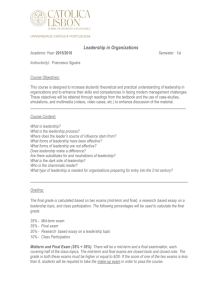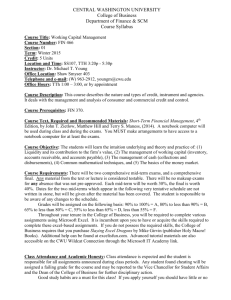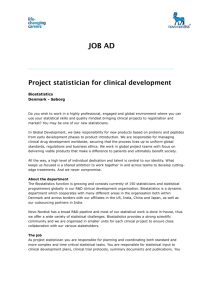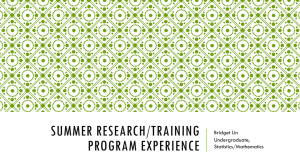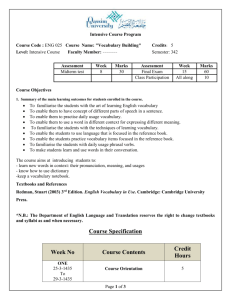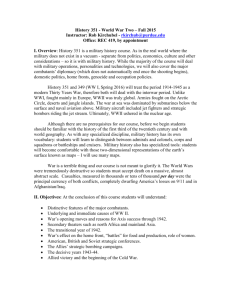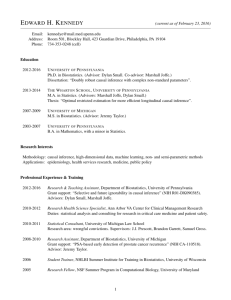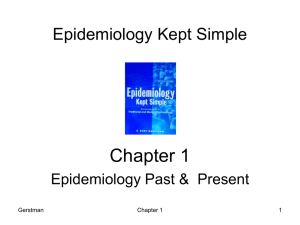- University of Hawaii at Manoa
advertisement
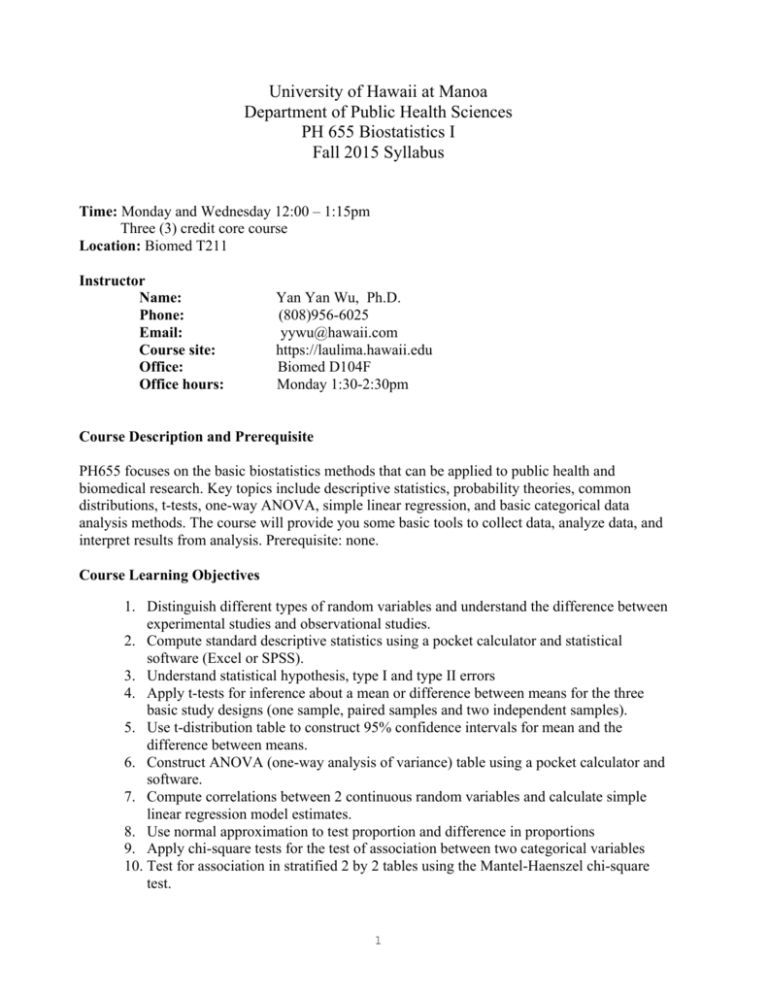
University of Hawaii at Manoa Department of Public Health Sciences PH 655 Biostatistics I Fall 2015 Syllabus Time: Monday and Wednesday 12:00 – 1:15pm Three (3) credit core course Location: Biomed T211 Instructor Name: Phone: Email: Course site: Office: Office hours: Yan Yan Wu, Ph.D. (808)956-6025 yywu@hawaii.com https://laulima.hawaii.edu Biomed D104F Monday 1:30-2:30pm Course Description and Prerequisite PH655 focuses on the basic biostatistics methods that can be applied to public health and biomedical research. Key topics include descriptive statistics, probability theories, common distributions, t-tests, one-way ANOVA, simple linear regression, and basic categorical data analysis methods. The course will provide you some basic tools to collect data, analyze data, and interpret results from analysis. Prerequisite: none. Course Learning Objectives 1. Distinguish different types of random variables and understand the difference between experimental studies and observational studies. 2. Compute standard descriptive statistics using a pocket calculator and statistical software (Excel or SPSS). 3. Understand statistical hypothesis, type I and type II errors 4. Apply t-tests for inference about a mean or difference between means for the three basic study designs (one sample, paired samples and two independent samples). 5. Use t-distribution table to construct 95% confidence intervals for mean and the difference between means. 6. Construct ANOVA (one-way analysis of variance) table using a pocket calculator and software. 7. Compute correlations between 2 continuous random variables and calculate simple linear regression model estimates. 8. Use normal approximation to test proportion and difference in proportions 9. Apply chi-square tests for the test of association between two categorical variables 10. Test for association in stratified 2 by 2 tables using the Mantel-Haenszel chi-square test. 1 Textbook: Basic Biostatistics by B. Burt Gerstman (Jones & Bartlett, 2008) Textbook Website: http://publichealth.jbpub.com/book/gerstman/staTable.cfm Reference Books: Introductory Applied Biostatistics by Ralph B. D’Agostino, Sr., Lisa M. Sullivan, and Alexa S. Beiser (Brooks/Cole Cengage Learning, 2006) Essentials of Biostatistics in Public Health by Lisa M. Sullivan (Jones & Bartlett, 2012) Statistical Software: EXEL or SPSS SPSS Site License: https://www.hawaii.edu/sitelic/spss/spss.html Course Policies: All students are expected to attend the class and do the assigned homework. Plagiarism is unacceptable for all exams and will result in a failing grade for the course, depending on the extent of the violation. Please be familiar with the University of Hawaii Student Conduct Code, available at the Office of Student Affairs at the Student Services Center. The course schedule may need to be revised and some topics may be rescheduled depending on the progress of the class. Students are encouraged to come during office hours to ask questions. Exams Students are allowed to bring a reference/formula sheet (2-sided), not to exceed 8½” by 11" (letter size), of their own construction, to all exams. No restrictions on content. No flaps; all pasted or taped on pieces must be properly glued or taped down on all four sides. You will need a calculator for basic calculations. Electronic dictionaries, cellphones, tablets, i-watch are not allowed. The only documentary evidence that will be accepted to support missing the exams due to illness is the Physician’s note. Students need to notify the instructor at least 2 weeks before the exams if there is a conflict with the scheduled exam. A deferred exam will be scheduled. The final exam is cumulative, but will focus on the contents after the second mid-term exam. 2 PH 655 Course Schedule week # Date 1 24-Aug 26-Aug Ch 1, 2, General Biostatistics concepts Ch 3, 4 Frequency Distributions/Summary 2 31-Aug 2-Sep Ch 4 Ch 5 3 7-Sep 9-Sep No class, labor day Ch 6 Binomial Probability Distribution 4 14-Sep 16-Sep Ch 7 Ch 8 Normal Probability Distribution Intro Statistical Inference/Sampling 5 21-Sep 23-Sep Ch 8 Intro Statistical Inference/Sampling Review 6 Topics Assignments Summary Statistics Probability Concepts 28-Sep 30-Sep Ch 9 Mid-term Exam 1 (Ch 1-8) Basics of Hypothesis Testing 7 5-Oct 7-Oct Ch 9 Ch 10 Basics of Hypothesis Testing Basics of Confidence Intervals 8 12-Oct 14-Oct 9 19-Oct 21-Oct Ch 11 Inference about A Mean Ch 12 Comparing Independent Means Ch 13 Comparing Several means (ANOVA) Ch 14 Correlation and Regression 10 26-Oct 28-Oct 11 Ch 14 Correlation and Regression Review 2-Nov 4-Nov Ch 18 12 9-Nov 11-Nov Ch 18 Cross-tabulated counts No class / Veteran’s Day 13 16-Nov 18-Nov Ch 19 Stratified tables No Class 14 23-Nov 25-Nov Ch 16 Ch 17 15 30-Nov 3-Dec Review Project Consultation / Review 16 8-Dec 10-Dec Group Presentation Group Presentation 17 14-Dec Final Exam (12-2pm, 2 hours) A1 Due A2 Due Mid-term Exam 2 (Ch 9-14) Cross-tabulated counts Inference about a Proportion Comparing Two Proportions 3 A3 Due Grading Grading Scheme Mid-term Exam 1 Mid-term Exam 2 Assignments Group Presentation Final Exam A+ = 98-100% A = 95-97% A- = 90-94% B+ = 87-89% B = 84-86% B- = 80-83% C+ = 77-79% C = 70-76% C- = 66-69% D+ = 63-65% D = 60-62% D- = 55-59% F < 55% Percentage 20% 20% 10% 20% 30% Excellent, distinctive work. Demonstrate sophisticated understanding of the course material and know how to use it in different situations. Above average work. Understand most of the statistics concepts and reasoning and can solve most of the problems. Average work, sufficient, but not distinctive. Understand basic statistics concepts and reasoning and can use statistical tools to solve basic problems. Poor, insufficient work for understanding statistics concepts and reasoning. Unacceptable work for understanding statistics concepts and reasoning. University Policy and Accommodations 1. Non-Discrimination The University is committed to a policy of nondiscrimination on the basis of race, sex, age, religion, color, national origin, ancestry, handicap, marital status, arrest and court record, sexual orientation, and veteran status. 2. Accommodations Any student who may need an accommodation based on the impact of a disability is invited to contact me privately within first weeks of the course. I would be happy to work with you, and the KOKUA Program (Office for Students with Disabilities) to ensure reasonable accommodations in my course. KOKUA can be reached at (808) 956-7511 or (808) 956-7612 (voice/text) in room 013 of the Queen Lili'uokalani Center for Student Services MPH Competencies: CPH6. Apply basic statistical methods for inference (BIOSTATS). CPH7. Apply descriptive techniques commonly used to summarize public health data (BIOSTATS). CPH8. Interpret results of statistical analyses found in public health studies (BIOSTATS). 4


